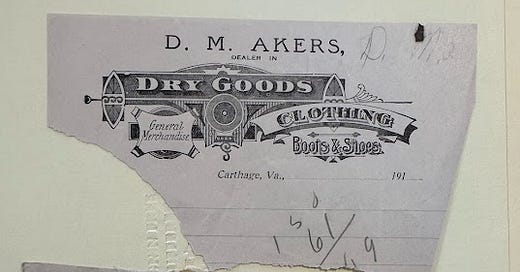Follow me down a rabbit hole to a genealogical treasure…
In February, Facebook’s algorithm showed me a post in my feed from the Wilderness Road Regional Museum about an 1809 Montgomery County, Virginia tax book. It instantly piqued my interest, since some of my ancestors lived there during that time. I immediately sent a message to the museum and asked if they would look for my ancestors’ names in the book.
Success! William Delaney, my 5th great-grandfather, appeared in the tax book.

Not only did I get to see an original record connected to my family, but I also found a new cousin! The museum’s education director is also a descendant of the Delaney family.
Wilderness Road Regional Museum Archives
Then, I started exploring the museum’s website. I was stunned to discover their large archives (nearly 15,000 primary documents), which have been meticulously cataloged into master lists and finding aids.
The Museum’s Archives include a wide range of primary documents, including letters, business records, store ledgers, family records, and legal records that date from as early as the middle years of the eighteenth century in the area of Pulaski County, Virginia. This treasury tells the story of this place and its people from the time of its founding on the American frontier through the twentieth century. Unique in scope, the Archives include documents related to early settlement, to slavery in the pre-Emancipation era, to farming during the late nineteenth century, and to the industrialization and de-industrialization of the region.
Primary documents pertaining to slavery and emancipation include records of legal proceedings, business transactions, poll tax lists, voter registration files, and lists of persons who voted in Pulaski County from the late 1800s up through the passage of the Voting Rights Act of 1965.
The Archival Photograph Collection includes rare photographs of Southwest Virginia communities, street scenes, public gatherings, construction work, businesses, and schools.
The Museum holdings also include letters from the front lines of the Civil War, the First World War, and the Second World War. Records of family farms in Pulaski County, spanning generations of farmers, are also available.
I downloaded the archives’ finding aids and filled out their research log, indicating which items I wanted to see. Then, I scheduled a research appointment and provided the completed research log.
D.M. Akers store in Carthage, Floyd County, Virginia
The catalog item at the top of my list was the “Carthage, VA store ledger 1906/07.” Carthage (also known as “White Rock”) is a small community in Floyd County, Virginia, where my great-grandmother Rushie Dulaney was born and raised. I was thrilled that I could see transactions at a local store where Rushie’s family may have shopped.
I struck gold.

The ledger has an index (although some of the index pages are missing) and the accounts are organized alphabetically by the account owner’s last name. I took the time to go through each page of the ledger, and it was well worth it.

I recognized so many family names throughout the book. It was also interesting to see the types of goods people purchased at that time, and how they paid off their accounts. While there were some cash transactions, bartering was more common. Shoppers would exchange things like produce, meat, eggs, and manual labor for their purchases. It was also interesting to see how people would buy goods on credit on someone else’s account (usually a family member).



Research your New River Valley ancestors at the Wilderness Road Regional Museum
If you have ancestors from the New River Valley (Floyd, Giles, Montgomery, and Pulaski counties), I highly recommend visiting the Wildnerness Road Regional Museum!
Location
5240 Wilderness Road
Dublin, Virginia 24084
Hours of Operation
Wednesdays, Thursdays, Fridays, and Saturdays, 10:30 AM - 4:30 PM
Schedule a research appointment
Call (540) 674-4835 or email





What a treasure to come across - good work! The info really tells the story of how people managed money and resources, but also how a community worked together. Great history in there!
Good find.